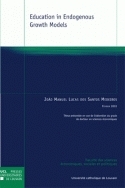- EAN13
- 9782930344232
- Éditeur
- Presses Universitaires du Louvain
- Date de publication
- 1 août 2005
- Collection
- Thèses de l'École polytechnique de Louvain
- Nombre de pages
- 191
- Dimensions
- 16 x 2,8 cm
- Poids
- 317 g
- Langue
- eng
Éducation In Endogenous Growth Models
Joao Manuel Lucas Dos Santos Medeiros
Presses Universitaires du Louvain
Prix public : 16,60 €
This PhD thesis consists of four papers, whose major aim is to analyse the role of education in an endogenous growth setting. The theoretical framework uses computable OLG models, where the behaviour of individuals is modelled within a lifecycle framework. Firstly, in order to build computable general equilibrium models that are reliable for policy analysis, it is necessary to reproduce all major stylised facts that characterise lifecycle profiles, notably: i) the marked decline in consumption around retirement age; and, ii) in old age, financial wealth data drawn from surveys run down at a slower pace than that implied by usual formulations of the lifecycle theory of consumption. In the first paper, it is argued that a lifecycle framework can reproduce the above-mentioned facts if one assumes: i) uncertainty in the duration of life in a model with imperfect annuity markets; and, ii) existence of a “sufficiently” strong bequest motive. Secondly, it is shown that education choices can play a major role in dampening the negative impact on economic growth of a decline in fertility. In the second paper, it is found that the growth assumption (endogenous versus exogenous) does matter. In an endogenous growth model driven by education, a negative demographic shock represents an “investment opportunity” in education. The rise in education, together with the externalities in human capital formation bring about a permanent increase in labour productivity. Thirdly, in an OLG model with an externality in the education sector, it is important to investigate the set of policies that decentralises the social optimum, depending on some major model assumptions. In the third paper, using calibrations that assume altruism, the results suggest that optimal policies involve basically: a) an education subsidy; and, b) a PAYG pension. Fourthly, given the complementary of education and R&D;, it is important to investigate if the adoption of optimal policies to correct a number of externalities causes a leverage effect on growth and welfare. The framework developed in the fourth paper provides for a numerical evaluation of the relative importance of two sources of inefficiency, namely: i) a “market- power” distortion, resulting from the mark-up pricing of intermediate goods; ii) versus the inefficiency in the allocation of resources caused by various “externalities”, affecting the education and R&D; sectors. Overall, the results obtained highlight the importance of treating human capital as an endogenous variable.


















